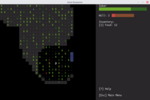Black Hole Blues and Other Songs from Outer Space by Janna Levin
book, review, science
This review was originally posted at Goodreads and imported here later with next to no spell/grammar checking.
5/5 stars
On paper, this sounded like the perfect book for me. Consider: it’s about my favourite subject (astronomy), my favourite spacetime phenomena (black holes), about one of the most ridiculously impossibly massive scientific endeavours to date (gravitational waves interferometers) and it’s written by an author who, while being a scientist (theoretical cosmologist) herself, by her own admission does not like a lot of scientific literature because it’s too dry and prefers fiction (a kindred spirit).
Well, the book was excellent! Absolutely amazing. It is brimming with emotion, stories (fantastic as well as horrific). It documents a human and scientific achievement that is absolutely staggering.
The author has embedded herself within the LIGO teams and witnessed much of the recent history leading towards the gravitational wave detection (spoiler alert!) and writes as much about the people, events and stories that unfolded as about the science.
The project lasted decades, endured doubts and push-back from the wider scientific community, requiring multi-year industry studies (is it even technologically possible to build this thing?), politicking (the U.S. Congress had to approve the budget) and personal disagreements.
It documents the extremely complicated story of Joseph Weber. Inspiring and tragic, on par with N-rays when viewed from one direction, founder of the gravitational detection field itself from another and a person who’s fallout almost destroyed it as well.
Unlike in fiction, the stories here are almost never simple. There’s never a clear villain. Never a spotless hero.
There’s the story of Jocelyn Bell Burnell, who as a grad student detected the first pulsars (neutron stars). It shows how that slowly helped turn the acceptance that black holes may be actual physical objects and not just some mathematic quirks of General Relativity. How Burnell did not get the Nobel price while her advisor did, quite possibly because she was a woman. About the people who were outraged and how she stated she didn’t think she deserved the price, being just a grad student. How she won basically every other price there ever was.
The author tell the stories from as many vantage points as she could get. Often citing multiple parties' perspectives and highlighting where their views or recollections differ. The book is never judgemental, never proposing the "right" interpretation.
Again, this is life. People are complex and memories notoriously unreliable. I have a huge respect for Janna Levin. She did not try to simplify or smooth out the truth. She puts everything on the table, contradictions and all.
Given how incredibly young the field of gravitational waves is (the first paper on the topic having been published by Albert Einstein in the year 1915 — a little over a hundred years ago) with the first ever detection recorded in 2015, most of the people involved in the project are still alive. Or were while the book was being written. The author got to speak to a lot of the people directly involved.
The book is an emotional roller coaster. How often can you say that about a science book?
You don’t need any scientific knowledge to enjoy it. It describes the whole century-long story in more or less a chronological order and it tries to impart the understanding of the sheer insanity this project was and the involvement of the people who made it happen.
The book was finished before the gravitational waves were detected, acknowledging the event in the epilogue. So it reads like an honest thrilling tale, uncertain to the last minute rather than a description of a done deal.
I love it to bits.
